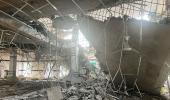'This strike has certainly enhanced your image.'
'Otherwise, people would have called you a damp squib, capable of doing nothing except talking big.'

"If you are looking for a permanent deterrent solution, a long-term solution, then you will have to hit the Pakistani military and ISI targets to genuinely raise costs and consequences," Major General G D Bakshi (retd) tells Prasanna D Zore/Rediff in the concluding part of the interview.
This interview was conducted before the announcement of a ceasefire on May 10, 2025.
What could be the escalatory measures that India could undertake without the two nations plunging into all-out war?
The simple fact is that it all depends on the next response from Pakistan.
If you want to consider that, then you know what is the matrix of Pakistan's response options: You hit with BrahMos missiles and SCALP (also known as Storm Shadow: A long-range, air-launched cruise missile used by Rafale jets in the Indian Air Force); they could retaliate with their cruise missiles -- their Abdalis, Baburs, and Hatf series (Hatf-I, Hatf-II, Hatf-III, Hatf-IV, Hatf-V, Hatf-VI), and the Chinese M-11.
They can hit you back with those but if they do we have a very good anti-ballistic missile defence. Apart from the US, Russia, China and Israel, we have one of the very good anti-air ballistic defense systems.
In terms of the S-400 Triumf Russian anti-missiles system, they can look up to 600 kms, detect targets at 600 kms, and take down targets at 400 kms. That means to the extremity of Pakistan.
If Pakistan fires these missiles, we could very well shoot down at least 80%, if not 90%, of them (before they hit their targets on Indian soil). That is the capability of the Indian air defence system.
The first option is that they respond in kind with cruise or ballistic missiles. Option two, they hit with their air force in airstrikes. And option three is they launch fire assaults across the Line of Control with artillery firing, as they have been doing.
They claim to have killed ten of our civilians. That's again very cowardly, and it is a pretty cowardly thing to do. But you can't put it past Pakistan.
The next level of escalation is if they want to go in for ground attacks across the LoC. And the even higher level is ground attacks across the international border. But those are very dangerous responses.
Everything will depend on what Pakistan does.
One thing I can make clear is that the moment Pakistan targets your military assets or civilian populations, it would give us just the opportunity and justification we are looking for to hit Pakistani military ISI targets because the real perpetrators of terror are not so much the terrorists; they are expendable cannon fodder for the Pakistan army.
The Pakistani army couldn't care less how many terrorists you kill because they are a no-cost, low-cost option. They pick them up from the slums, get them to madrassas, spawning them by the thousands.
If you eliminate a hell of a lot of terrorists, well, it has a deterrent effect for a time, but it's not the deterrent solution -- the permanent deterrent solution, the long-term solution that you are looking for.
You will have to hit the Pakistani military and ISI targets to genuinely raise costs and consequences.
Raise costs and consequences. Enforce deterrence by punishment.

What does this failure of Pakistan's defences to intercept Indian missiles tell us about Pakistan's vulnerabilities?
It (the missile strikes against terrorist hideouts in Pakistan) has highlighted it (India's air defence capabilities) for the world to see.
If, as the Pakistani prime minister is saying, 75 to 80 Indian jet fighters attacked -- and you, of course, are making wild claims -- the actual fact is you haven't shot down a single one. That means your radar failed to pick them up.
Don't forget, when the Iranians attacked them with ballistic missiles, their radar -- Chinese radar -- failed to pick them up. The Pakistanis, in their complaints with the Chinese, essentially said, 'Your radar are useless. They don't pick anything up. They failed.'
Do you think China is selling Pakistan junk?
It is junk.
Chinese technology is not tested in combat. So, they can make all sorts of claims until it is put to the test of combat. If it fails, well, that's it.
You know, so we have been able to penetrate their air defences, no question about it. We've been able to achieve surprise. We've been able to inflict substantial damage on the terror targets.
Now, will Pakistan give us the -- I wouldn't call it an excuse, but I would call it justification -- to go for the next target set: That is, to go for Pakistani military-ISI targets, which are the real terror masterminds, the real puppet masters.
What could be going on in the minds of Pakistan's generals, and what might be their strategic intent if they chose to respond militarily?
The last time Pakistan responded (after the Balakot air strike) the very next day. A quick retort, a quick strike, or something they called it. They responded the very next day to our attack.
This time, they seem to have bitten off more than they can chew, and there is a lot of caution imposed on them. So, they may not react in a hurry. They may have learned from us to delay the response and to prepare and execute a proper response.
The point is, can (Pakistan army chief General) Asim Munir, despite all the dovish noises being made by his defence minister, and the rest of them, can he afford not to hit back at all?
His military prestige, the prestige of the institution, is at stake. And the army has not been doing too well as far as the public is concerned ever since (former Pakistan prime minister) Imran Khan shook the army's hold upon the public imagination. They are in, I would say, very unhappy straits.
They have not been doing too well against the Baluchi insurgents. The Tehrik-e-Taliban Pakistan has been significantly challenging them. The Afghan Taliban have also been turning very aggressive.
They know the kind of populist pressure they are under. To say that they (the Pakistan army) will just not react and will calm down, putting their tail between their legs, is overly, overly optimistic. It almost sounds like wishful thinking.

Do you see Operation Sindoor as a shift from tactical cross-border actions to overt missile-based punitive deterrence?
Punitive deterrence, yes. But it has to go further if you really want to deter, as I have been pointing out again and again in this interview.
How important was real-time intelligence and surveillance in enabling the success of India's precision strikes inside Pakistani territories?
That is the essence. If you hit thin air, then what use is it? It's just wastage of precious precision-guided munitions.
I am told that is why the strike was delayed, because they were shifting their terrorist camps, personnel, and high-value assets all over the place to avoid an Indian strike hitting a high-value target. But we were able to locate targets, and ten members of Masood Azhar's family have been eliminated.
What does Operation Sindoor signal to China and other adversaries about India's evolving military posture?
China first said that it condemned the terrorist strike. Then, when they found India was getting serious, they said, '(Our relationship with Pakistan is) Higher than the mountains, deeper than the seas, an ironclad relationship.' But what does it mean?
China just wanted a thaw with you (India in Ladakh). Why did they want to thaw with you in Ladakh? Because they have to face Taiwan, Japan, Vietnam, America. They want to focus on their eastern front.
(China) Opening the western front (against India) is stupid at this time. They want to ramp down tensions. Now, if for the sake of Pakistan they have to get into a mess with India, I don't think they would be too happy.
They will provide intelligence support. They would provide logistics, equipment, ammunition support, some drone presence here and there. But they will not put boots on the ground.
They will not come to Pakistan's aid, period. It will be mostly behind the scenes -- behind-the-scenes support: Moral support, diplomatic support.
How will this operation impact India's global image as a responsible yet assertive regional power?
This strike has certainly enhanced your image. Otherwise, people would have called you a damp squib, capable of doing nothing except talking big, and then the moment it comes to the crunch, start talking of peace, ahimsa and non-violence.
It is definitely an enhanced image for resolve, political will, will to conflict, will to fight.
Do you think this was also a message to China, that China cannot take India for granted?
Also to Bangladesh, and our entire extended neighbourhood, to the great big countries in the world -- to Russia, China, the United States, and our allies, friends, and people who are not so friendly.
It is a clear message: Don't you mess with India.










